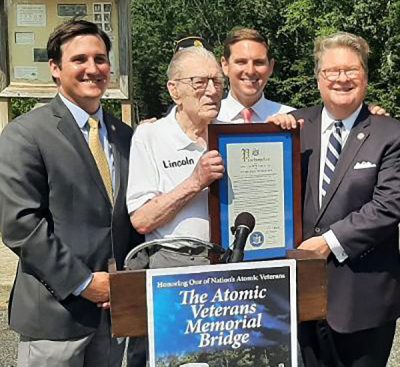Harckham, Byrne Commemorate Atomic Veterans Memorial Bridge
News Based on facts, either observed and verified directly by the reporter, or reported and verified from knowledgeable sources.

State Sen. Peter Harckham (D-Lewisboro) and Assemblyman Kevin Byrne (R-Mahopac) commemorated the dedication of the Atomic Veterans Memorial Bridge over the Taconic State Parkway last Tuesday at a special gathering held in Woodlands Legacy Field Park.
Joining the two state lawmakers were representatives from the National Association of Atomic Veterans, local veterans and municipal officials, including Yorktown Supervisor Matt Slater.
Last October, Gov, Kathy Hochul signed legislation that was introduced by Harckham and Byrne designating the pedestrian bridge over the Taconic State Parkway in Yorktown as the Atomic Veterans Memorial Bridge. Recently, signage on the parkway was installed include the newly-dedicated name of the bridge, which was built in 2007 and is part of the Yorktown Trailway.
The legislation was initiated after Byrne attended a Memorial Day service in 2019 where, Ed Gettler, a local veteran and past state commander of the National Association of Atomic Veterans (NAAV), spoke about the brutal realities of war, specifically in the early years of testing atomic and nuclear weapons.
“In service to our country, the men and women we know as Atomic Veterans should never be forgotten,” Harckham said. “They stood at the forefront of a new nuclear age, and in many cases made the ultimate sacrifice or were sickened because of their willingness to do their patriotic duty. Renaming this bridge commemorates these veterans and offers some recognition in the hope that others may want to learn more about their place in history.”
Byrne noted that for more than 40 years, their existence was kept a secret by the federal government, preventing them from sharing their stories publicly until after 1996.
“I’m grateful to the amazing Atomic Veterans and advocates who both helped locally and throughout our state and country to raise awareness about the sacrifices made by these brave military service members,” Byrne said. “The new Atomic Veterans Memorial Bridge name will help increase awareness about the service and sacrifice made by atomic veterans, teaching generations of New Yorkers about who they are, what they did, and why we must honor them.”
From July 1945 to September 1992, the United States conducted 1,032 nuclear tests. More than 220,000 service members in the U.S. Army, Navy and Marines were present during the tests up until 1963, whether as clean-up crews, technicians or witnesses. During that time, many of the veterans were unaware of the harmful effects that radiation from nuclear fallout has on the human body, and did not know that their health was at risk.
Many of the veterans weren’t provided proper protective gear, and any grievances they had were often covered up under a forced oath of silence. To break this oath of silence, even to talk among other atomic veterans, was considered treason and punishable by prison.
“Our community is proud to recognize our brave veterans, who, in defense of our nation, were exposed to atomic radiation,” said Slater. “We thank Senator Harckham and Assemblyman Byrne for their actions to have the former ‘Bridge to Nowhere’ renamed to honor these brave soldiers.”
Among those attending the event last week was Dr. F. Lincoln Grahlfs, past vice commander of NAAV and author of “Voices from Ground Zero: Recollections and Feelings of Nuclear Test Veterans.” Grahlfs, who will turn 100 in December, served as a chief petty officer in the Navy during Operation Crossroads, the nuclear weapons tests conducted by the U.S. at Bikini Atoll in the Pacific in 1946.
He was at the helm of a rescue tug ordered to decontaminate the USS Texas and suffered radiation poisoning.
“Atomic veterans have struggled to get recognition for the past 70 years,” Grahlfs said. “The renaming of the bridge here is one good step in a succession of things that need to be done.”
“It is our hope this commemoration will be the catalyst for others to learn more about the history of the Atomic Veterans,” added Keith Kiefer, national commander of NAAV.

